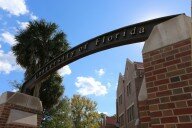In 2001 the terrorist attacks from al-Qaeda ensued, killing nearly 3,000 people.
Fast forward to September 2014.
Four verified attacks, each involving women, occurred on or around the University of Florida, Gainesville campus.
However, despite the pain and the fear that struck in the hearts of many people in the previous incidents, the week of September 8-14 displayed what Florida students could do when they united: The result was nothing but raw understanding and selflessness.

(From left to right) Pooja Pachigar, 21; Komal Junejo, 21; Stephanie Wong, 20; and Kaitlin Beranek, 20; watch a video recapping the racism toward Southeast Asians and Middle Easterns after the 9/11 attacks in Turlington L007 on Thursday, September 11 at the “9/11 United in Remembrance” panel.
On Tuesday, September 9, a female graduate student took steps toward uniting the Gator community in an initiative to counter the violent assaults. Nikki Steinberger, 24, a Student Personnel in Higher Education graduate student at UF launched the “No Gator Walks Alone” banner signing.
Steinberger’s intent was to create an event that was two-fold: to encourage students to take responsibility for themselves and to forge a selfless environment in which students care for one another.
“Whether we have eight students here or 800 hundred, this is our community and we need to be here for one other,” Steinberger said in an interview.
At the signing, students gathered around the multiple banners reading, “No Gator Walks Alone” and signed their names, pledging that neither themselves nor their peers would walk alone.
Janine Sykes, assistant vice president of UF Media Relations and Student Affairs, exclaimed, “Look at them!”
“I think they recognize that someone has come on their campus and they’re trying to empower themselves to take back the University of Florida,” Sykes said.
And take back the university, they did.
Since the last attack, few students have been spotted walking alone.

UF students from various cultural organizations like the Asian American Student Union (AASU), Islam on Campus (IOC) and Delta Epsilon Psi (DEPsi) light a candle outside Turlington Hall for the 9/11 “United in Remembrance” candlelight vigil on Thursday, September 11. The gathering served to honor the lives that were lost 13 years ago and to increase awareness for multicultural acceptance.
Students now walk in pairs around campus. Young men from various organizations volunteer their time and energy to accompany students to and from their designated location as a part of the “Walk Safe” program, and Facebook statuses and group posts are full of friends sacrificing gas to offer others a ride home whenever.
In a time of adversity gators became a great force not to be trifled with.
However, the effort towards building a better community did not stop there.
On Thursday, September 11, Narayan Kulkarni, 20, hosted the “9/11 United in Remembrance” multicultural panel and candlelight vigil.
Inspired by his own personal experiences of otherness, bullying and micro aggression after the 9/11 attacks, Kulkarni orchestrated a sound booth for the South Asian-American, Muslim-American, Sikh-American and Arab-Americans who shared the Kulkarni’s same sentiments in Turlington L007.
Representatives from various organizations including Asian American Student Union, Arab Students Association and Islam on Campus and Sikh Students Association took part in the panel to answer questions of discrimination and to share their experiences.

From left to right, Amana Abdulwakeel, 21, Hayat Kemal, 19, Aymen Almdrrani, 23, and Farahnaz Hadjimiry, 20 join the “9/11 United in Remembrance” panel as speakers highlighting their personal experiences with racism and religious discrimination as an aftermath of the 9/11 attacks.
Among some of the disturbing stories was one from 20-year-old Farahnaz Hadjimiry:
Hadjimiry was 12 or 13 years old when her father and she were checking out of a Target store line in West Palm Beach, Florida.
At the register, the female cashier asked to see her father’s credit card. The name on the card was Hassam Hadjimiry.
The father and daughter finished their transaction and walked out of the store.
Soon after exiting, they recognized the same cash register attendee following them to their car and writing down the car’s license plate.
When questioned about the woman’s actions, the lady responded saying, “I have belief that you’re committing some suspicious activity and I’m going to report your license plate number to the police,” recalls the younger Hadjimiry.
As Hadjimiry recalls the event, she commented saying, “I was twelve years old and this lady singled us out, out of everyone.”
Shar Siddiqui, 20, also recalls difficult times because of her Pakistani American identification. As a fifth grader, Siddiqui remembers seeing the words “GO HOME PAKI” spray-painted on the hurricane shutters of her garage door.
She also recalls various instances in middle school in which students would refer to her personally as a “terrorist.”

Via: fansided.com
Despite such hurtful incidents, Siddiqui believes the situation has improved.
“It’s gotten a lot better,” said Siddiqui, “especially in the college atmosphere where people are more educated [….] and aware of the fact that not everybody can be defined by one person’s actions or a group of people’s actions.”
In these events, both the banner signing and candlelight vigil on the Gainesville campus became exemplary instances of what a community can do when it unites in a time of tribulation.
Though previously only known for uniting in support of sports, that week unearthed a new level of Gator unification and inner strength: It showed how the strong man may start a fight, but a great man ends it.
So when people say it’s great to be Gator, you know it’s true.
Featured photo courtesy of: actionnewsjax.com





